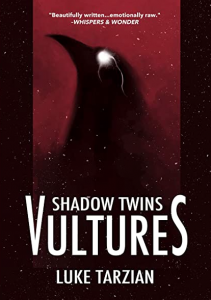
“I told you pain would rule this night.” — Behtréal
As an avid reader of fantasy I’ve enjoyed many novels about beings of such extreme power that they live far above the concerns of ordinary mortals. Among my favorites is The Chronicles of Amber, Roger Zelazny’s series of novels about a royal family of superhumans who battle one another on infinite parallel worlds where even reality itself can be reshaped.
Though authors often create characters with powers beyond mortal comprehension, it’s rare for the characters themselves to be utterly alien in their worldview, experiences and desires — so much so that it becomes a challenge for readers to understand them at all.
Luke Tarzian manages this feat in Vultures, the first book in the dark fantasy horror series Shadow Twins. The novel is about powerful beings who have a role to play in a world that has been ravaged for 500 years by an existential war with demons. Events turn on these three protagonists:
- Theailys An, a haunted man seeking to reforge the Keeper’s Wrath, a weapon to eradicate the demon hordes that should have been defeated when their lord Te Mirkavahil died in battle.
- Serece, an immortal king’s daughter who caused her sister’s death in combat. She’s repulsed and drawn to Theailys after a premonition about his true identity.
- Behtréal, an enigmatic figure who walks the world with a belief he can restore his people.
The novel is dark, bleak and at times completely unsparing in its depiction of horror. Readers should be prepared for that.
Tarzian creates a dense and evocative setting where events were set in motion long before the novel began, lending it a fatalistic tone from the first page. As a reader I liked being made to feel like things had already gone too far for the protagonists to have any hope of success. What’s more grimdark than that?
The novel spends a great deal of time inside the heads of the main characters, sometimes in long internal dialogues that explore the philosophical underpinnings of the struggles they undertake.
Theailys isn’t just talking to himself in there. A demon possessing his mind has a lot to say and frequently asks to be let out to wreak unspeakable violence, which Theailys can only find out about afterwards.
This was my favorite relationship in the book because it revealed character and served as a power to be wielded in moments of total desperation. There are plenty of those in Vultures, where an army of animated corpses called lokyns increases their ranks with the victims they kill like the legions of the Night King in Game of Thrones.
Comparisons like that are a bit misleading because this novel is so different in its ambitions. This is not a novel about gathering heroic forces to win the ultimate battle against zombies. Tarzian takes readers to places that an author like Zelazny or GRRM would never venture.
With some novels you need a precise understanding of everything that takes place. Tarzian instead offers a psychological experience where the literal can be supplanted by the emotional and events are understood by their accumulation. This was an effective technique to make the characters knowable on their own terms.
At times I became lost in the non-linear plot but had faith in the destination because of how well-crafted it was. There are even dream sequences that leave one wondering whether something is actually happening or not. That kind of complexity can steer a story crashing into the rocks but Tarzian is a skilled captain who brings it to shore. His writing felt meticulous instead of indulgent.
I’ve been sparse in describing the plot both to avoid spoilers and because I fear getting some of it wrong! This is a novel that probably ought to be read twice in succession to pick up on things that were missed the first time around.
